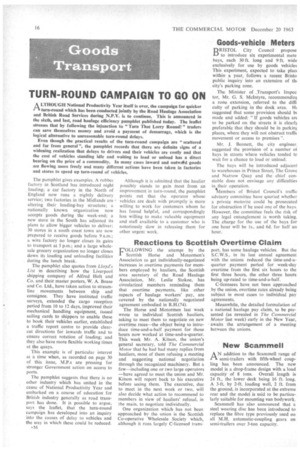TURN-ROUND CAMPAIGN TO GO ON
Page 18

If you've noticed an error in this article please click here to report it so we can fix it.
ALTHOUGH National Productivity Year itself is over, the campaign for quicker
turn-round which has been conducted jointly by the Road Haulage Association and British Road Services during N.P.Y. is to continue. This is announced in the sixth, and last, road haulage efficiency pamphlet published today. The leaflet stresses that by following the injunction to "Turn That Lorry Round!" traders can save themselves money and avoid a payment of demurrage, which is the logical alternative to unreasonable turn-round delays.
Even though the practical results of the turn-round campaign are "scattered and far from general ", the pamphlet records that there are definite signs of a widening realization that delays to drivers and their vehicles are costly and that the cost of vehicles standing idle and waiting to load or unload has a direct bearing on the price of a commodity. In many cases inward and outwatd goods are flowing more freely and many different actions have been taken in factories and stores to speed up turn-round of vehicles.
The pamphlet gives examples. A rubber factory in Scotland has introduced night loading; a car factory in the North of England now runs a nightly delivery service; two factories in the Midlands are altering their loading-bay structure; a nationally known organization now accepts goods during the week-end; a new store in the South has adjusted its plans to allow bigger vehicles to deliver; 30 stores in a south coast town are now prepared to receive goods before 9 a.m.; a wire factory no longer closes its gates to transport at 5 p.m.; and a large wholesale grocery organization no longer closes down its loading and unloading facilities during the lunch break.
The pamphlet also quotes from Lloyd's List in describing how the Liverpool shipping company of Alfred Holt and Co. and their master porters, W. A. Boase and Co. Ltd., have taken action to streamline movements between ship and consignee. They have instituted traffic surveys, extended the cargo reception period from 10 to 12 days, improved their mechanical handling equipment, issued sailing cards to shippers to enable these to book their vehicles earlier, established a traffic report centre to provide clearcut directions for inwards traffic and to ensure correct rotation of loading; and they also have more flexible working times at the quays.
This example is of particular interest at a time when, as recorded on page 30 of this issue, M.P.s are pressing for stronger Government action on access to ports.
The pamphlet suggests that there is no other industry which has united in the cause of National Productivity Year and embarked on a course of education for British industry generally as road transport has done. It is possible to argue, says the leaflet, that the turn-round campaign has developed into an inquiry into the causes of delay to vehicles and the way in which these could be reduced.
416 Although it is admitted that the haulier possibly stands to gain Most from an improvement in turn-round, the pamphlet points out that the operator whose • vehicles are dealt with promptly is more willing to work for customers whom he has found helpful, and correspondingly less willing to make valuable equipment and staff available to a customer who is notoriously slow in releasing them for other urgent work.




























































































